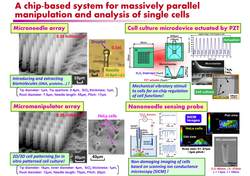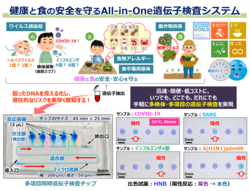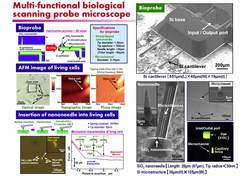
Shibata, Takayuki
| Affiliation | Department of Mechanical Engineering |
|---|---|
| Concurrent post | Center for Diversity and Inclusion Institute for Research on Next-generation Semiconductor and Sensing Science (IRES²) |
| Title | Professor |
| Fields of Research | Micro/Nanomachining / MEMS/NEMS (Micro/Nano Electro Mechanical System) / Lab-on-a-chip (LOC) |
| Degree | Ph.D (Hokkaido University) |
| Academic Societies | The Japan Society for Precision Engineering (JSPE) / The Japan Society of Mechanical Engineers (JSME) / The Institute of Electrical Engineers of Japan (IEE) / The Surface Finishing Society of Japan (SFSJ) / The Society of Life Support Technology (LST) |
| shibata@me Please append ".tut.ac.jp" to the end of the address above. |
|
| Laboratory website URL | http://mems.me.tut.ac.jp/ |
| Researcher information URL(researchmap) | Researcher information |
Research
Establishment of interdisciplinary Monodzukuri (manufacturing) basic technology in micro- and nano-scale. Novel micro- and nano-structuring techniques for manufacturing MEMS/NEMS devices, and MEMS-based platform for in vitro manipulation and analysis of living cells for supporting the creation of innovation in life science and biotechnology.
Theme1:Innovative genetic diagnostic devices based on microfluidic technology
Overview
To proactively address future pandemics, there is an urgent challenge to establish a rapid and easy sample-to-answer platform for the simultaneous detection of multiple nucleic acid targets across multiple samples in a single operation. This capability is crucial for protecting human life and well-being, and for ensuring a safe and resilient society. Moreover, the demand for genetic testing is expanding across diverse fields, including the detection of food allergens and foodborne pathogens to ensure food safety and sanitation, as well as the inspection of crop diseases and pests to support a sustainable food supply. Therefore, we are developing (1) microfluidic devices for multiplexed genetic diagnosis across multiple samples, (2) logarithmic parallel dilution microfluidic devices for rapid and reliable detection of target nucleic acids, (3) microfluidic digital LAMP devices for absolute quantitative detection of targeted nucleic acids, and (4) microfluidic devices for automated nucleic acid extraction.
Selected publications and works
Riku Honda, Taketo Saruwatari, Daigo Natsuhara, Yuka Kiba, Shunya Okamoto, Moeto Nagai, Masashi Kitamura, and Takayuki Shibata, A high-speed sequential liquid compartmentalization method for digital loop-mediated isothermal amplification in a microfluidic device, Lab Chip, Vol.25, No.18 (2025) 4787-4799. DOI: https://doi.org/10.1039/D5LC00486A.
Akira Miyajima, Fumiya Nishimura, Daigo Natsuhara, Yuka Kiba, Shunya Okamoto, Moeto Nagai, Tadashi Yamamuro, Masashi Kitamura, and Takayuki Shibata, Parallel dilution microfluidic device for enabling logarithmic concentration generation in molecular diagnostics, Lab on a Chip, Vol.25, No.13 (2025) pp.3242-3253. DOI: 10.1039/D5LC00356C.
Daigo Natsuhara, Ryogo Saito, Hiroka Aonuma, Tatsuya Sakurai, Shunya Okamoto, Moeto Nagai, Hirotaka Kanuka, and Takayuki Shibata, A method of sequential liquid dispensing for the multiplexed genetic diagnosis of viral infections in a microfluidic device, Lab on a Chip, Vol.21, No.24 (2021) pp.4779-4790. DOI: 10.1039/D1LC00829C.
Keywords
Theme2:A chip-based system for massively parallel manipulation and analysis of single cells (Cellular MEMS)
Overview
 MEMS-based platform for in vitro manipulation and analysis of living cells for addressing fundamental questions in biological systems.
MEMS-based platform for in vitro manipulation and analysis of living cells for addressing fundamental questions in biological systems.A thorough understanding of cellular functions is a prerequisite for realizing biological applications such as medical diagnostics, drug discovery, and tissue engineering. Therefore, I have been developing novel MEMS devices for massively parallel manipulation and analysis of single cells. These include (1) an array of out-of plane, hollow nanoneedles capable of introducing desired biomolecules (DNA, proteins, etc.) into living cells and extracting biomolecules expressed in the cells, (2) a micromanipulator array capable of massively parallel manipulation of single living cells for 2D/3D cell patterning, (3) a cell culture microdevice actuated by piezoelectric thin film for on-chip regulation of cell functions, and (4) non-damaging measurement system for monitoring cell-shape dynamics based on scanning ion conductance microscopy (SICM).
Selected publications and works
Takayuki Shibata, Tatsuya Ozawa, Yasuharu Ito, Keita Yamamoto, and Moeto Nagai, Minimally Invasive Intracellular Delivery Based on Electrokinetic Forces Combined with Vibration-Assisted Cell Membrane Perforation, Japanese Journal of Applied Physics, Vol.56, No.1 (2017) 017001. DOI: 10.7567/JJAP.56.017001.
Takahiro Kawashima, Takahiro Sakai, Norihisa Kato, Takayuki Shibata, Mitsuyoshi Nomura, Takashi Mineta, and Eiji Makino, Characterization and Insertion Performance of Hollow Microneedle Array for Cell Surgery, Journal of Micro/Nanolithography, MEMS, and MOEMS, Vol.8, No.3 (2009) 033014. DOI: 10.1117/1.3206971
Keywords
Theme3:Novel scanning probe microscopy techniques for cellular function analysis (Bioprobe)
Overview
With the aim of introducing novel atomic force microscope (AFM) applications to cellular function analysis, I have been developing a newly designed AFM probe (bioprobe): this enables intra- and extra-cellular delivery of biomolecules (DNA, proteins, etc.). Moreover, the bioprobe will provide other useful functions, such as scanning ion conductance microscopy (SICM) for non-damaging imaging of biological cells, and tip-enhanced Raman scattering (TERS) spectroscopy for quantitatively study on dynamic processes inside living cells. Therefore, I can provide a method for correlation analysis of cellular functions with high spatial and temporal resolution.
Selected publications and works
Takayuki Shibata, Hiromi Furukawa, Yasuharu Ito, Masahiro Nagahama, Terutake Hayashi, Miho Ishii-Teshima, and Moeto Nagai, Photocatalytic Nanofabrication and Intracellular Raman Imaging of Living Cells with Functionalized AFM Probes, Micromachines, Vol.11, No.5 (2020) 495. DOI: 10.3390/mi11050495.
Takayuki Shibata, Kenji Nakamura, Shuhei Horiike, Moeto Nagai, Takahiro Kawashima, Takashi Mineta, and Eiji Makino, Fabrication and Characterization of Bioprobe Integrated with Hollow Nanoneedle for Novel AFM Applications in Cellular Function Analysis, Microelectronic Engineering, Vol.111 (2013) pp.325-331. DOI: 10.1016/j.mee.2013.02.051.
Keywords
Title of class
Micromachining Engineering (M41630040) / Advances in Mechanical Design (M41630330) / Advanced Mechanical Systems Design II (M41630220) / Advanced Production Processes (D51030020)



